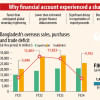More exchange rate flexibility needed

Bangladesh's macroeconomic performance has significantly improved since the country entered the IMF's $4.7 billion loan programme in January last year, but the bleeding of foreign currency reserves continues, putting the taka under pressure, the global lender said yesterday.
"It is important that the next stage of the reform agenda is to allow greater flexibility in the exchange rate, which would help address the problem in external account," said Krishna Srinivasan, director of the Asia and Pacific department of the International Monetary Fund, in a virtual briefing from Singapore.
The external account involves all interactions of the domestic economy with the rest of the world. It can give insights on a country's economic strength.
He was speaking in response to a question at the briefing after releasing the regional economic outlook for Asia and the Pacific.
Bangladesh proactively approached the IMF for support for its home-grown programmes having two components -- addressing the macroeconomic stability and addressing the longer structural issue related to climate change, he said.
He pointed out that there has been significant improvement in macroeconomic performance. The growth has been projected at 5.7 percent for this fiscal year and 6.6 percent for next fiscal year.
"There have been improvements in monetary policy framework and improvements in fiscal performance.
"I think where Bangladesh was struggling was with the current account, which was just balanced, partly because there was restraint on imports."
Srinivasan, however, said the financial account was not performing very well. "So, in some sense, you could see the reserve was depleting and taka was coming under pressure."
The current account records a nation's transactions with the rest of the world, while the financial account is a component of a country's balance of payments that covers liabilities to foreigners.
Srinivasan further said Bangladesh should allow greater flexibility in its exchange rate to address issues in its external account, particularly the deficit in the financial account.
"Once you implement this, you will see a greater sense of stability returning to the external account."
This suggestion from the Washington-based lender comes as Bangladesh Bank has yet to allow market forces to fully determine the exchange rate, with two banking bodies periodically announcing the rates.
During the July-March period of the current fiscal year, the current account balance, a major component of the Balance of Payment (BoP), was in surplus by $4.7 billion.
In contrast, the financial account, another key part of the BoP that includes foreign direct investments and short, medium, and long-term loans, suffered from an $8.3 billion deficit. This is nearly four times the deficit from the same period a year ago as shown by Bangladesh Bank.
Srinivasan said that with reforms in the exchange rate and improvements in fiscal policy, Bangladesh should see a more sustained recovery from the crisis that every country in the region has faced due to multiple shocks.
Bangladesh entered the IMF's $4.7 billion loan programme in January last year. The IMF has set two types of conditions -- six performance conditions and several structural conditions. Maintaining the net international reserves (NIR) was one of the main conditions.
In the first review in November last year, the country failed to meet an NIR of $24.46 billion as of June 30 last year. Later, the global lender revised it down in December last year, and March and June this year. But Bangladesh failed to meet the target set for both December and March. The country may also fail to meet the target set for June this year.
The reserve situation has not improved much since the commencement of the loan programme. The country's gross forex reserves have been hovering around $20 billion in recent months, as per an IMF calculation. It was $19.97 billion on April 24.
The government had expected the reserves to improve after the January 7 election, but it did not.
According to the IMF assessment, the reason behind the deficit in the financial account is that the exchange rate is not market-based. As a result, export proceeds are not coming to the country while remittances are coming through unofficial channels.
A mission of the IMF has been reviewing the conditions of the loan programme before releasing the third trance worth $681 million, expected in June.
A finance ministry official said IMF could put more conditions to make the exchange rate market-oriented.


 For all latest news, follow The Daily Star's Google News channel.
For all latest news, follow The Daily Star's Google News channel. 









Comments